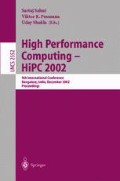Abstract
Both power and performance are important design parameters of the present day processors. This paper explores an integrated software and circuit level technique to reduce leakage power in L1 instruction caches of high performance microprocessors, by eliminating basic blocks from the cache, as soon as they are dead. The effect of this dead block elimination in cache on both the power consumption of the I-cache and the performance of the processor is studied. Identification of basic blocks is done by the compiler from the control flow graph of the program. This information is conveyed to the processor, by annotating the first instruction of selected basic blocks. During execution, the blocks that are not needed further are traced and invalidated and the lines occupied by them are turned off. This mechanism yields an average of about 5% to 16% reduction, in the energy consumed for different sizes of I-cache, for a set of the SPEC CPU 2000 benchmarks [16], without any performance degradation.
Access this chapter
Tax calculation will be finalised at checkout
Purchases are for personal use only
Preview
Unable to display preview. Download preview PDF.
References
Michael K Gowan, Larry L Biro and Daniel B Jackson: “Power Considerations in the Design of the Alpha 21264 Microprocessor,” DAC98, San Francisco, CA, 1998, pp 726–731. 79
Trevor Mudge: “Power: A First class Design Constraint for Future Architectures,” IEEE Conference, HiPC, India, 2000, pp 215–224. 79
Nikolaos Bellas, Ibrahim Hajj, Constantine Polychronopoulos and George Stamoulis: “Architectural and Compiler support for Energy Reduction in the Memory Hierarchy of High Performance Microprocessors,” ISLPED, ACM Press New York, USA, 1998, pp 70–75. 79, 80
Michael D Powell, Se-Hyun Yang Babak Falsa., Kaushik Roy and T N Vijayakumar: “Gated-Vdd: A circuit Technique to Reduce Leakage in Deep-Submicron Cache Memories,” ISLPED, 2000, pp 90–95. 79, 80, 81, 82
Se-Hyun Yang, Michael D Powell, Babak Falsa., Kaushik Roy and T N Vijayakumar: “An Integrated Circuit/Architectural Approach to Reducing Leakage in Deep-Submicron High-Performance I-Caches,” Proceedings of the International Symposium on High Performance Computer Architecture (HPCA), Jan 2001. 79, 80, 81, 82
Huiyang Zhou, Mark C Toburen, Eric Rottenberg and Thomas M Conte: “Adaptive Mode-Control: A Low-Leakage, Power-Efficient Cache Design,” TR, Dept. of Electrical amp; Computer Engg. North Carolina State University, Raleigh, NC, 27695–7914, Nov 2000. 79, 80, 81, 82
Kanad Ghose and Milind B Kamble: “Reducing Power in Superscalar Processor Caches Using Subbanking, Multiple Line Buffers and Bit-Line Segmentation,” ISLPED, ACM Press, New York, USA, 1999, pp 70–75. 79
Hongbo Yang, Guang R Gao, Andres Marquez, George Cai and Ziang Hu: “Power and Energy Impact by Loop Transformations,” http://research.ac.upc.es/-pact01/colp/paper12.pdf 79, 80
Stefanos Kaxiras, Zhigang Hu, Girija Narlikar and Rae McLellan: “Cache-Line Decay: A Mechanism to Reduce Cache Leakage Power,” IEEE workshop on Power Aware Computer Systems (PACS), Cambridge, MA, USA, 2000, pp 82–96. 79, 81, 85
Victor Delaluz, Mahmut Kandemir, N Vijayakrishna, Anand Sivasubramanian and Mary Jane Irwin: “Hardware and Software Techniques for Controlling DRAM Power Modes,” IEEE Trans. on Computers, Vol.50, No11, Nov 2001, pp 1154–1173. 80
Krishna V Palem, Rodric M Rabbah, Vincent J Mooney III, Pinar Kormatz and Kiran Puttaswamy: “Design Space Optimization of Embedded Memory Systems via Data Remapping,” CREST-TR-02-003 GIT-CC-02-011, Feb 2002. 80
John Hennessy: “The Future of Systems Research,” IEEE Computers, Aug 1999, pp 27–33. 80
J. Kin, M. Gupta and W. Mangione-Smith: “The Filter Cache: An Energy Efficient Memory Structure,” Proc. IEEE Int’l Symp. Microarchitecture, IEEE CS Press, 1997, pp 184–193. 80
Alfred V Aho, Ravi Sethi and Jeffrey D Ulman: “Compilers: Principles, Techniques and Tools,” Addison-Wesley, ISBN: 817-808-046-X, Third Indian Reprint 2000. 82
D Burger, Todd M Austin: “The Simplescalar Tool Set, version 2.0:,” CSD Technical Report #1342. University of Wisconsin-Madison, June 1997. 83
“SPEC CPU 2000 benchmark suite,” http://www.spec.org 79, 83
Stefanos Kaxiras, Zhigang Hu and Margaret Martonosi: “Cache Decay: Exploiting Generational Behavior to Reduce Cache Leakage Power,” Proc. of Int’l Symp. Computer Architecture, ISCA, ACM Press, New York, USA, 2001, pp 240–251. 79, 81
Suleyman Sair and Mark Charney: “Memory Behavior of the SPEC2000 Benchmark Suite,” Technical Report, IBM, 2000. 86
Author information
Authors and Affiliations
Editor information
Editors and Affiliations
Rights and permissions
Copyright information
© 2002 Springer-Verlag Berlin Heidelberg
About this paper
Cite this paper
Kabadi, M.G., Kannan, N., Chidambaram, P., Narayanan, S., Subramanian, M., Parthasarathi, R. (2002). Dead-Block Elimination in Cache: A Mechanism to Reduce I-cache Power Consumption in High Performance Microprocessors. In: Sahni, S., Prasanna, V.K., Shukla, U. (eds) High Performance Computing — HiPC 2002. HiPC 2002. Lecture Notes in Computer Science, vol 2552. Springer, Berlin, Heidelberg. https://doi.org/10.1007/3-540-36265-7_8
Download citation
DOI: https://doi.org/10.1007/3-540-36265-7_8
Published:
Publisher Name: Springer, Berlin, Heidelberg
Print ISBN: 978-3-540-00303-8
Online ISBN: 978-3-540-36265-4
eBook Packages: Springer Book Archive

